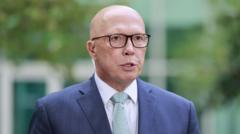In a surprising turn of events, Australian opposition leader Peter Dutton has abandoned plans to end work from home arrangements for public servants after facing significant public opposition. Dutton acknowledged the misstep during a press conference, emphasizing the importance of flexible working options.
Australia’s Opposition Leader Reverses Course on Work From Home Policy

Australia’s Opposition Leader Reverses Course on Work From Home Policy
Peter Dutton faces backlash as his campaign retracts promise to eliminate remote work for public servants.
Australia's opposition leader, Peter Dutton, has abruptly reversed an election promise to eliminate work-from-home options for public servants after experiencing significant backlash. On Monday, Dutton addressed the media, stating that his Liberal-National Coalition had "made a mistake" and issued an apology for the proposed policy, which had been part of a broader strategy intended to enhance efficiency within the public sector.
Scheduled elections are set for 3 May, and the coalition initially framed the policy as a means to streamline government operations, alongside a controversial plan to cut thousands of public service jobs. However, critics, including those from the current Labor government, highlighted that such measures would chiefly hinder women, who often rely on these flexible work arrangements.
"We got it wrong and we have unapologetically accepted that," Dutton remarked during his press conference, defending the intent while accusing the Labor Party of conducting a smear campaign against his policy. Shadow finance minister Jane Hume further clarified that the coalition would no longer pursue changing existing flexible working initiatives. "We understand that remote work is vital for maximizing productivity in any workforce," she stated.
Additionally, the coalition has amended its approach towards reducing the public service workforce, initially proposing cuts of 41,000 jobs. Hume committed to instead achieve the reduction through a hiring freeze and attrition over a period of five years, denying previous suggestions of forced redundancies. However, Dutton's remarks appeared to contradict Hume's clarification, stating, "We acknowledged the misjudgment in that policy and have clarified our stand."
As the Labor government capitalizes on these missteps, Employment Minister Murray Watt criticized Dutton's inconsistency, asserting that the changes demonstrate a deeper issue with his leadership. "His attempt to reinvent himself is insufficient; he cannot change his inherent character," Watt remarked on the Australian Broadcasting Corporation.
While globally, some leaders—inspired by figures like U.S. President Donald Trump—attempt to scale back workplace flexibility, public sentiment in Australia shows a strong preference for maintaining remote work practices, particularly amid rising cost-of-living concerns.



















